Make an easy weeknight meal of this Cabbage Soup with Vegetables, a classic recipe that’s every bit as quick as it is comforting. Shredded green cabbage is simmered in a flavorful broth with white beans, potatoes, and loads of other vegetables. The deceptively simple ingredients in this dish make for a cozy and tasty meal that will suit any season!
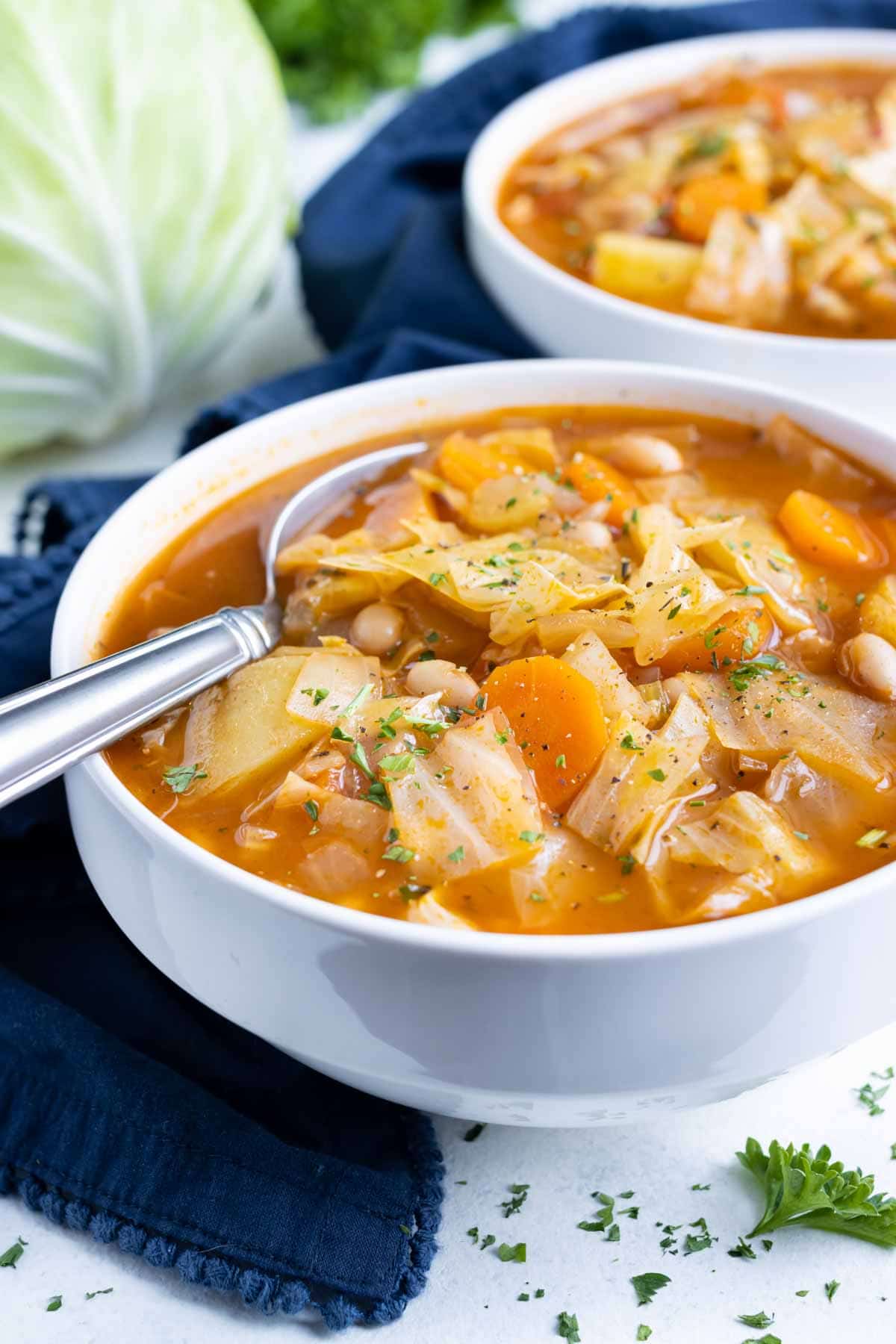
Table of Contents
It wasn’t until last year that I truly fell in love with cabbage.
From Sautéed Cabbage, to Roasted Cabbage Steaks, to the more traditional Stuffed Cabbage Rolls (and even Unstuffed Cabbage Rolls!), we simply couldn’t get enough of this tasty cruciferous vegetable.
And when I discovered that you could use this highly underrated ingredient to bulk up an otherwise thin and brothy soup, I had to give it a try!
Ingredients
For the exact measurements and detailed instructions, you can jump to the recipe.

- Cabbage. One small head of green cabbage, or half of a large one is recommended, to yield about 8-10 cups once it is all chopped up into 1-inch pieces. For more information on choosing and preparing a cabbage, see How to Cut and Shred Cabbage.
- Carrots. Any variety will work, but they should be peeled and cut into ½-inch slices to ensure cooking all the way through.
- Celery. For a softer texture the celery should be finely chopped; for bigger bites with a bit of crunch to them, cut them larger.
- Onion. Either a sweet variety (like Vidalia) or white onion is recommended, finely diced to avoid any raw pieces remaining. For more information on choosing and preparing an onion, see How to Cut an Onion.
- Potatoes. Yukon Gold or red potatoes are recommended for their firm texture, which holds up well to use in soups and stews. These should be cut into ½-inch chunks, about the same size as the carrots.
- Tomatoes. Both the canned sauce and diced varieties are used. Plain, unseasoned tomato sauce should be used for full control over seasoning. Crushed tomatoes can be substituted for the sauce, but it will create a more chunky texture in the broth.
- Beans. A variety of white beans like Great Northern, navy, or cannellini is ideal. Make sure to fully rinse and drain the beans before adding them to the soup.
- Worcestershire sauce. Adding this in is imperative for developing a lovely depth of flavor.
- Seasonings. Dried oregano, dried thyme, and paprika are used here, but other herbs may be used or substituted, to taste.
How to Make Cabbage Soup
Jump to the recipe for the full instructions, ingredient amounts, and a printable recipe.
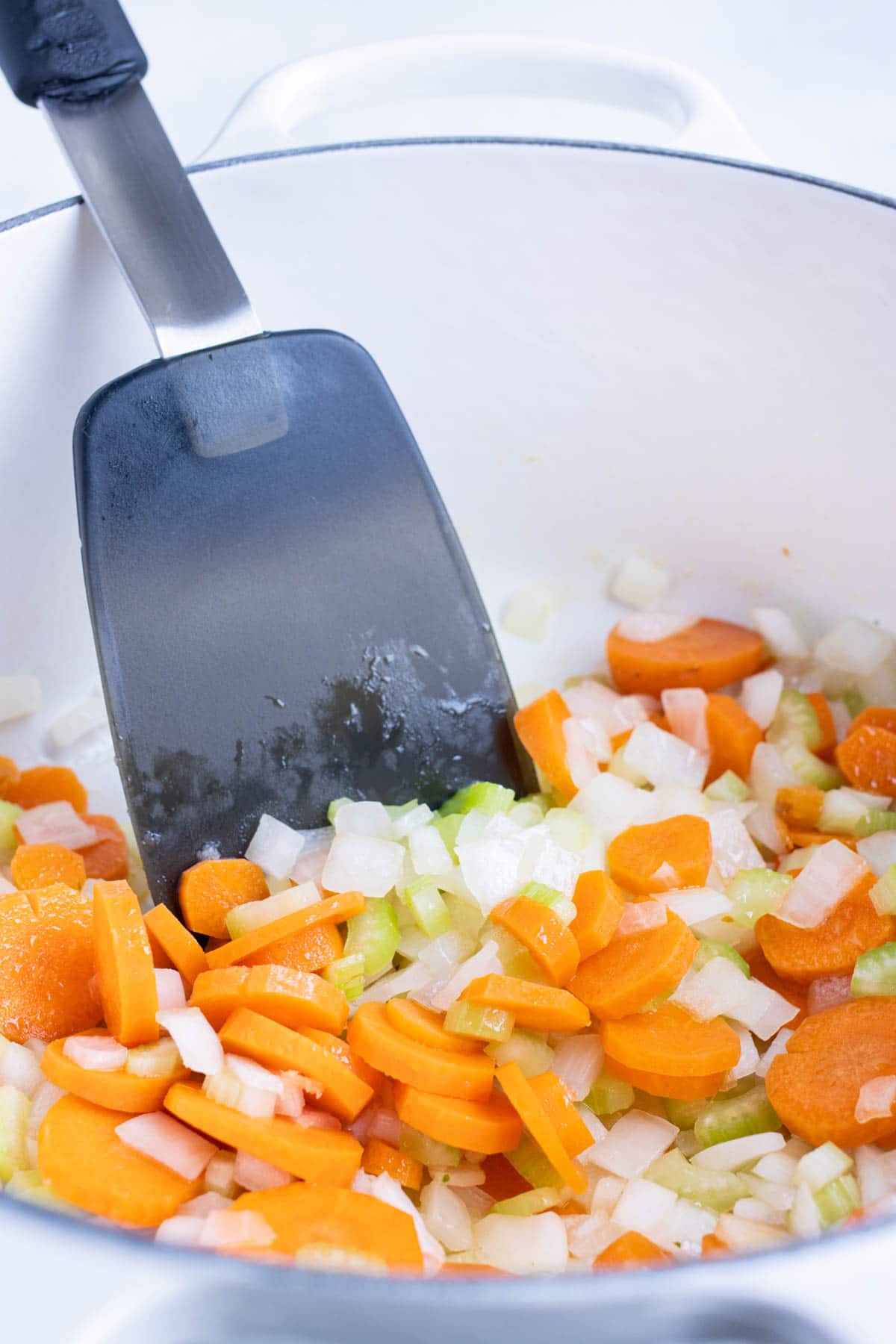
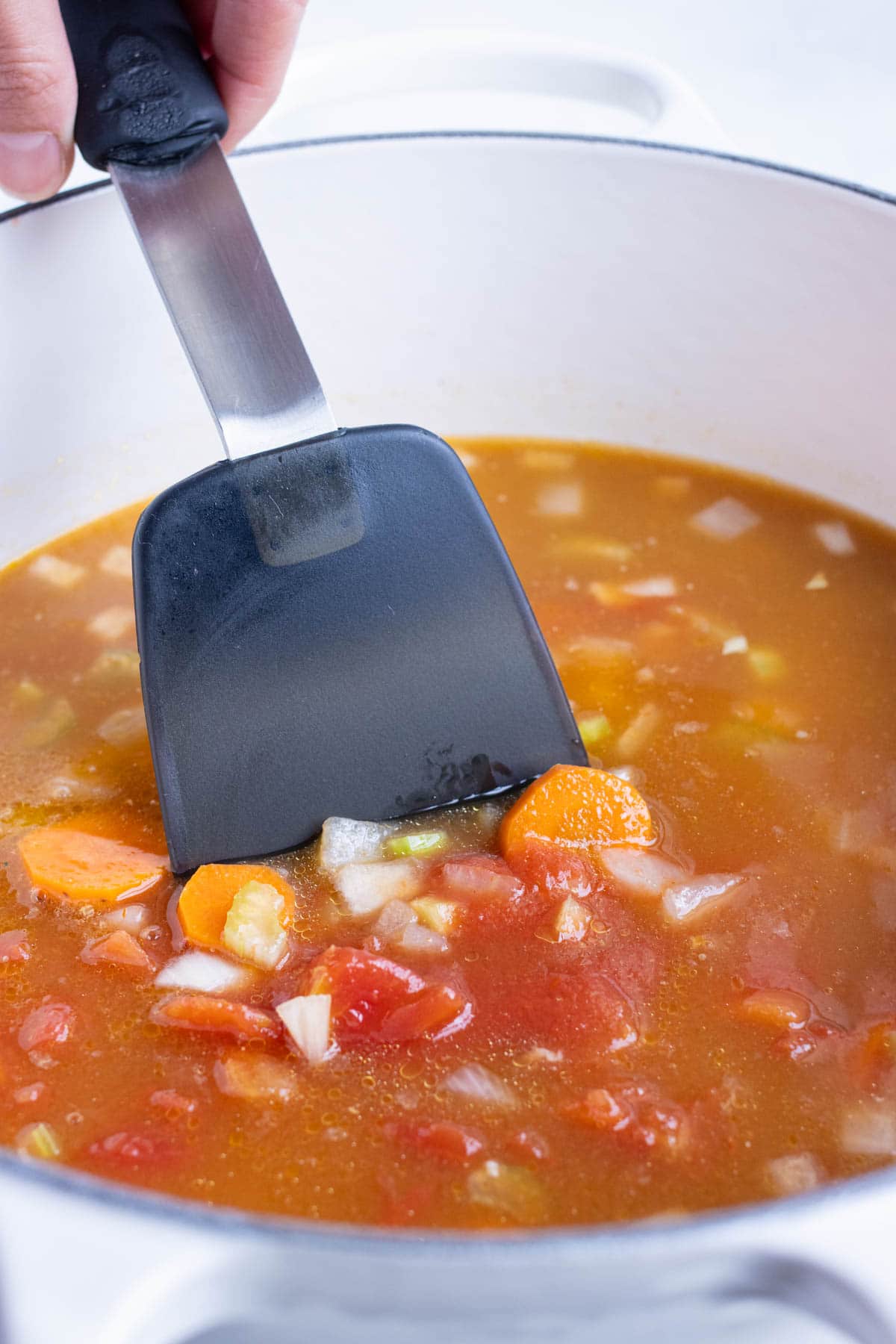
- Sauté the mirepoix. To a large pot or Dutch oven, add 2 tablespoons of oil and warm it over medium heat. Chop the onion, carrots, and celery as directed, and sauté for 3-4 minutes or until slightly softened. Add the garlic and continue sautéing the mix for an additional minute, or just until the garlic is fragrant. The finely minced garlic is added last and cooked the least because it will burn easier than the rest of the mirepoix.
- Pour and season. Add the diced tomatoes, tomato sauce, and broth of choice to make the base of the soup. Stir well, to ensure that any browned bits at the bottom of the pot get scraped up into the mix. Add the Worcestershire sauce, thyme, oregano, paprika, salt, and pepper, and stir very well to combine. Taste the broth and adjust to taste – it’s alright if it’s slightly salty at this stage, because the addition of the beans and cabbage will even it back out.
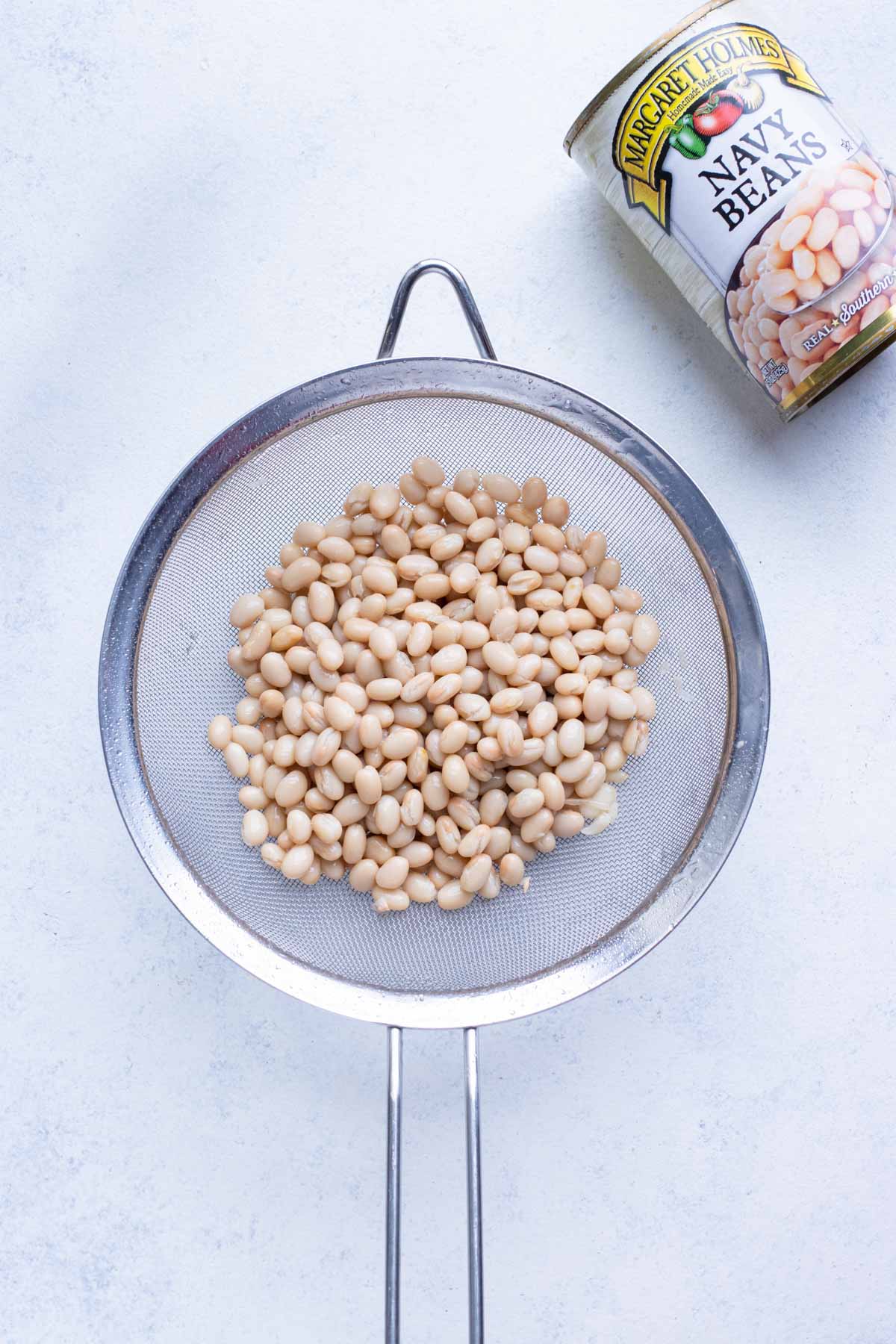
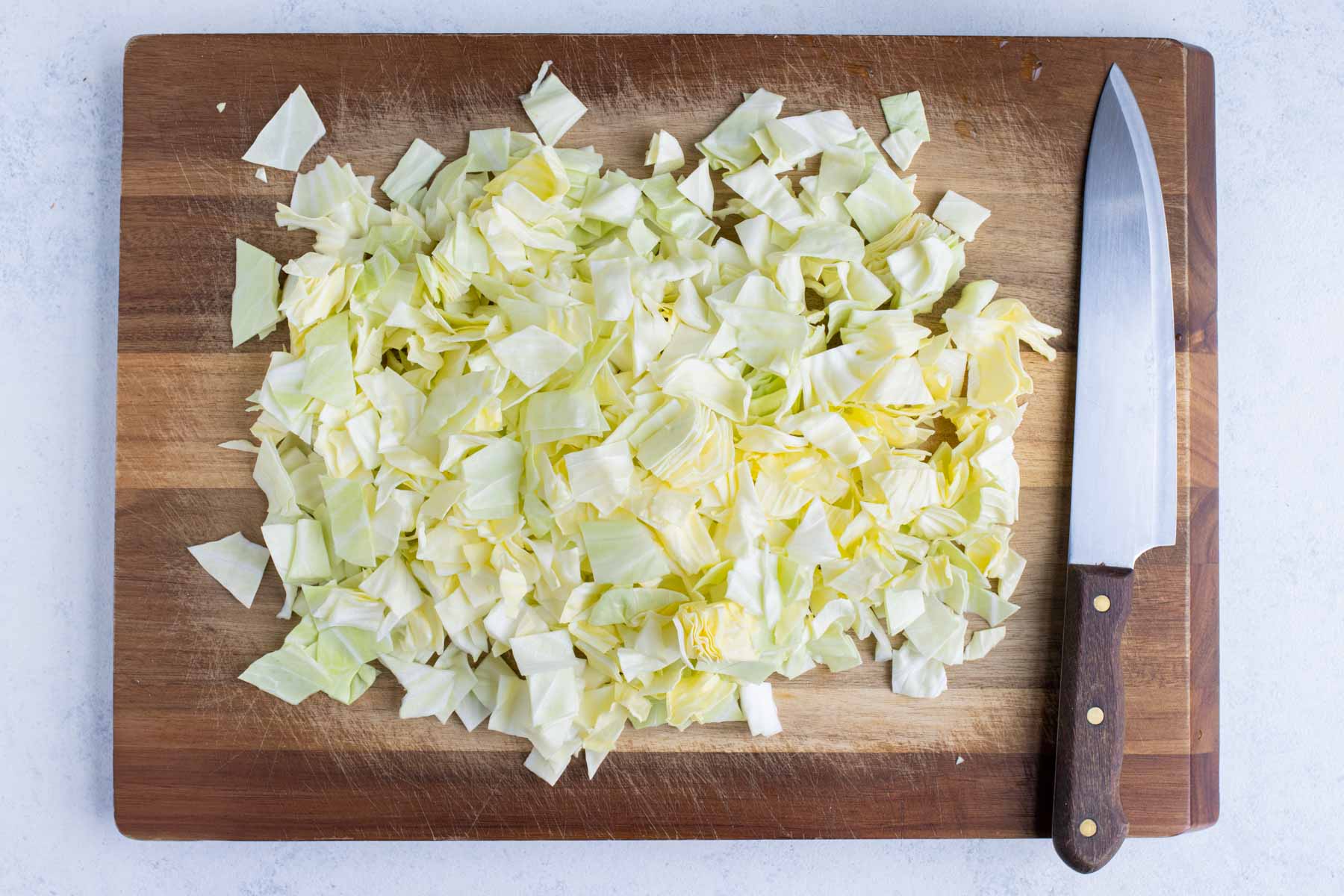
- Rinse the beans. Empty the can of beans into a small strainer, then rinse and thoroughly drain them. Set them aside to finish draining while preparing the rest of the vegetables.
- Prep the veggies. Give the potatoes and cabbage a thorough washing, to ensure any surface dirt is removed. Cut the potatoes into ½-inch cubes, and the cabbage into quarters. Holding the knife at a slight angle, carefully cut the tough inner cores out of the bottom of each cabbage wedge, and then cut the remaining sections into 1-inch pieces. This should yield about 8 cups of cut cabbage.
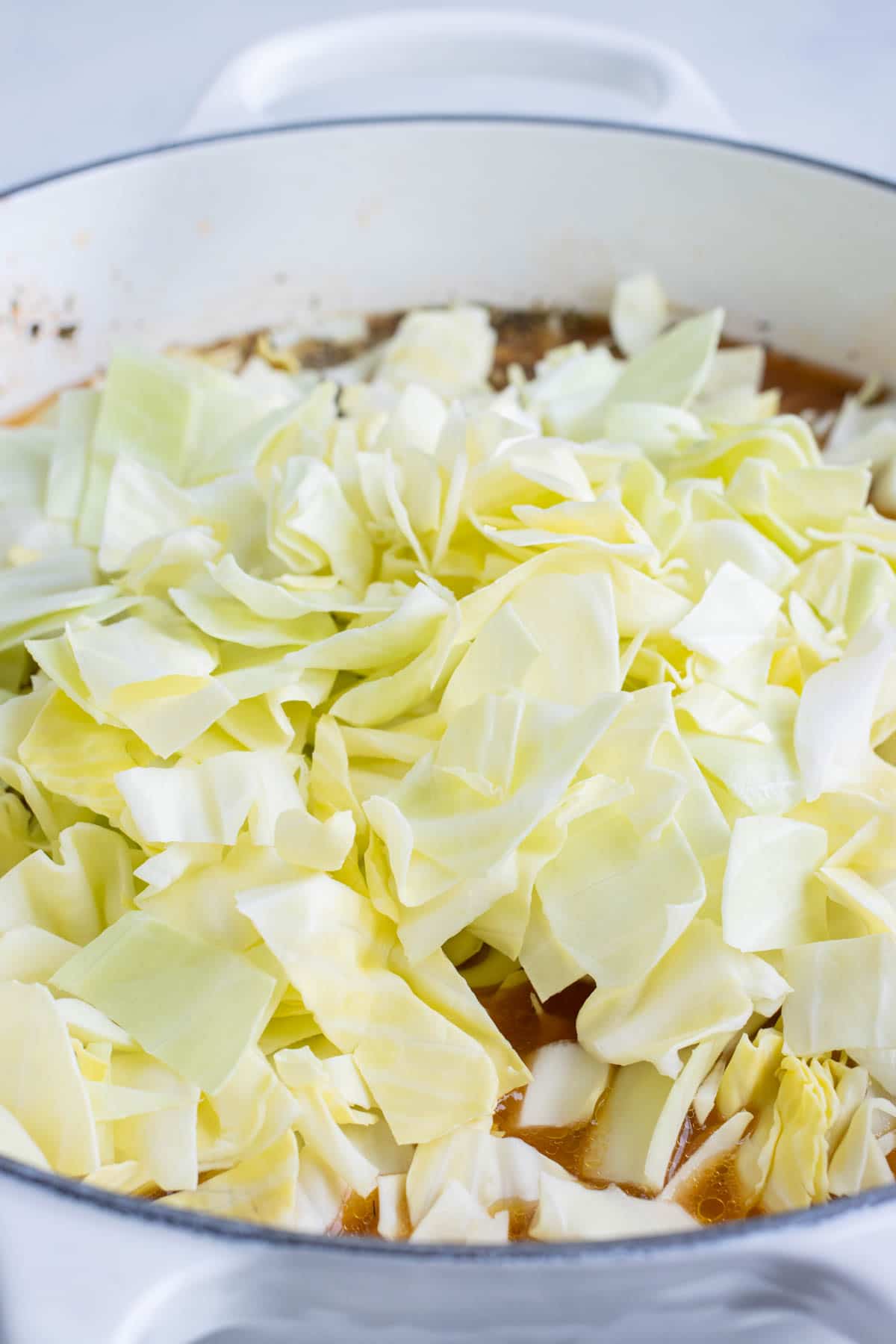
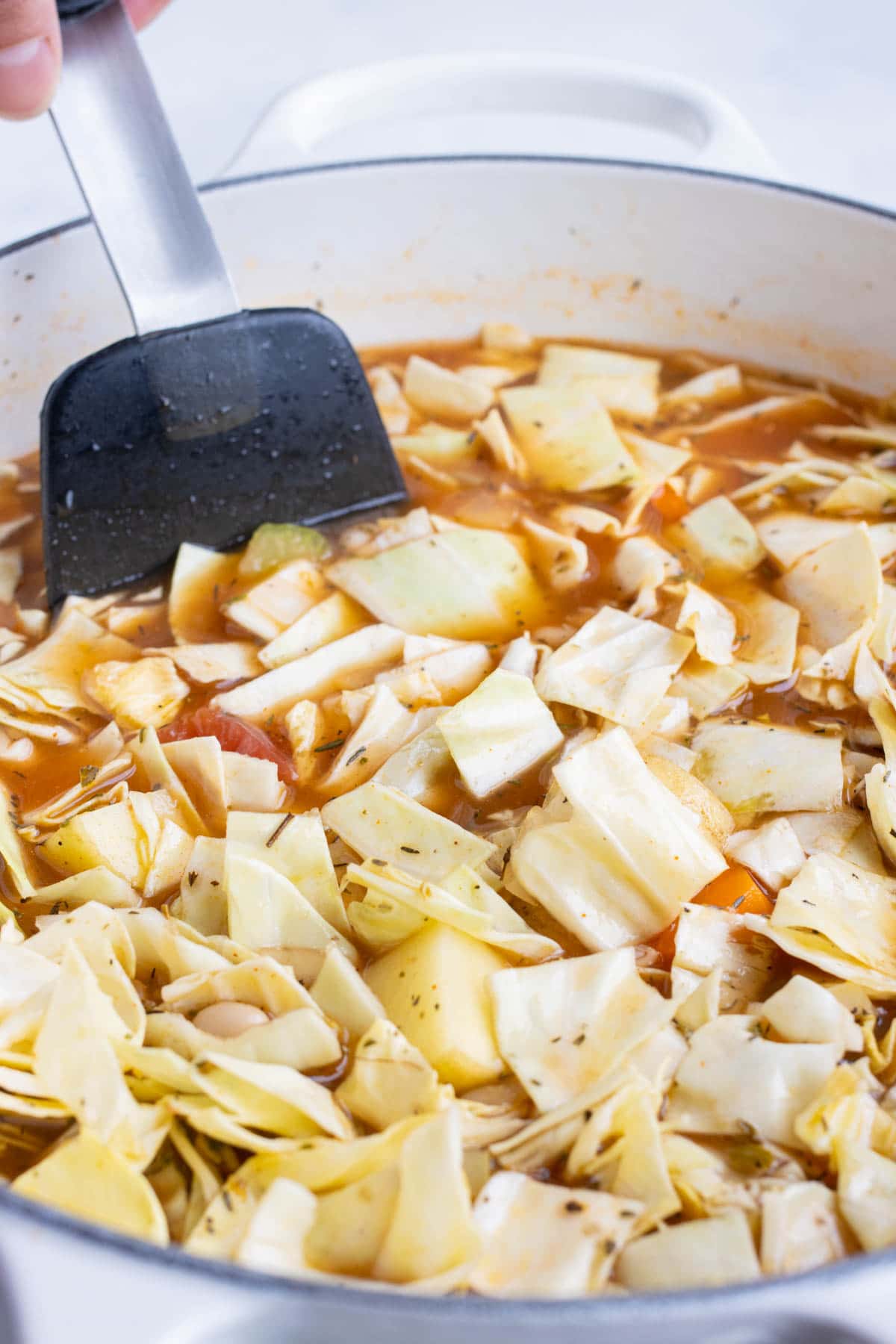
- Add remaining ingredients. Add the beans, potatoes, and cabbage to the pot and stir until everything is well mixed and the cabbage is mostly submerged. Don’t worry if it looks like a lot of volume in the pot, as the cabbage will shrink significantly when it begins to soften and cook down.
- Boil and simmer. Bring the soup up to a boil, stir well once more, and reduce the heat to medium. Cover the pot tightly with a lid, and simmer the soup for 20-25 minutes, or until the vegetables are tender. Give the soup one last taste for seasoning, and to test the texture of the vegetables, and adjust if needed. Serve immediately, with a sprinkle of fresh parsley in each bowl.
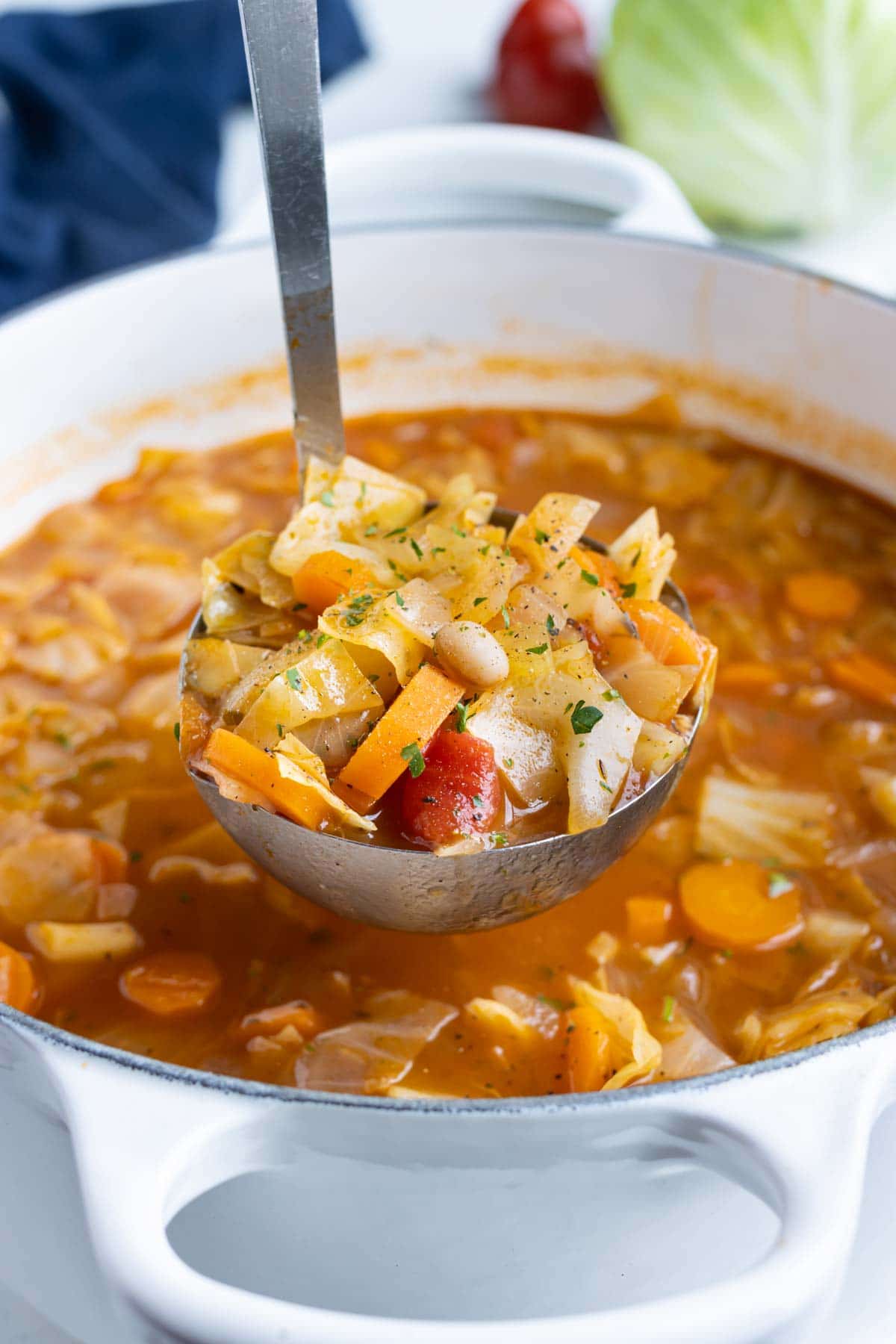
Meal Prep and Storage
- Prep-Ahead: Except for the garlic and potatoes, the vegetables can all be washed and chopped in advance, up to 2-3 days ahead. Garlic should be minced or pressed fresh, and potatoes should be cut at most 1 day ahead, and stored submerged in a bowl of cold water in the fridge.
- Storage: This dish will keep in an airtight container in the refrigerator for up to 4-5 days.
- Freezing: Cabbage soup can be stored in an airtight container in the freezer for up to 3 months. However, be aware that the texture of the potatoes may change slightly during the process of freezing and reheating.
- Reheating: To avoid overcooking the vegetables during reheating, it is recommended to let the soup – if frozen – thaw in the fridge at least 1 day in advance. From the fridge, it can be reheated in the microwave, or in bulk over medium heat on the stovetop until warmed through.
FAQs
Cabbage can be used in everything from slaws to salads to stir-fries, and so much more! Some delicious and versatile recipes for which leftover cabbage could be used include Homemade Southern Coleslaw, Fish Taco Slaw, Sautéed Cabbage, Roasted Cabbage Steaks, Unstuffed Cabbage Rolls, and Instant Pot Corned Beef and Cabbage. Served hot or cold, thick-sliced or finely shredded, there’s no shortage of recipes to create.
On its own, cabbage can freeze perfectly well so long as it’s been blanched first. Cooked cabbage in soup will freeze even better, reheating to almost the exact same consistency as when it was cooked fresh so long as it isn’t over-boiled.
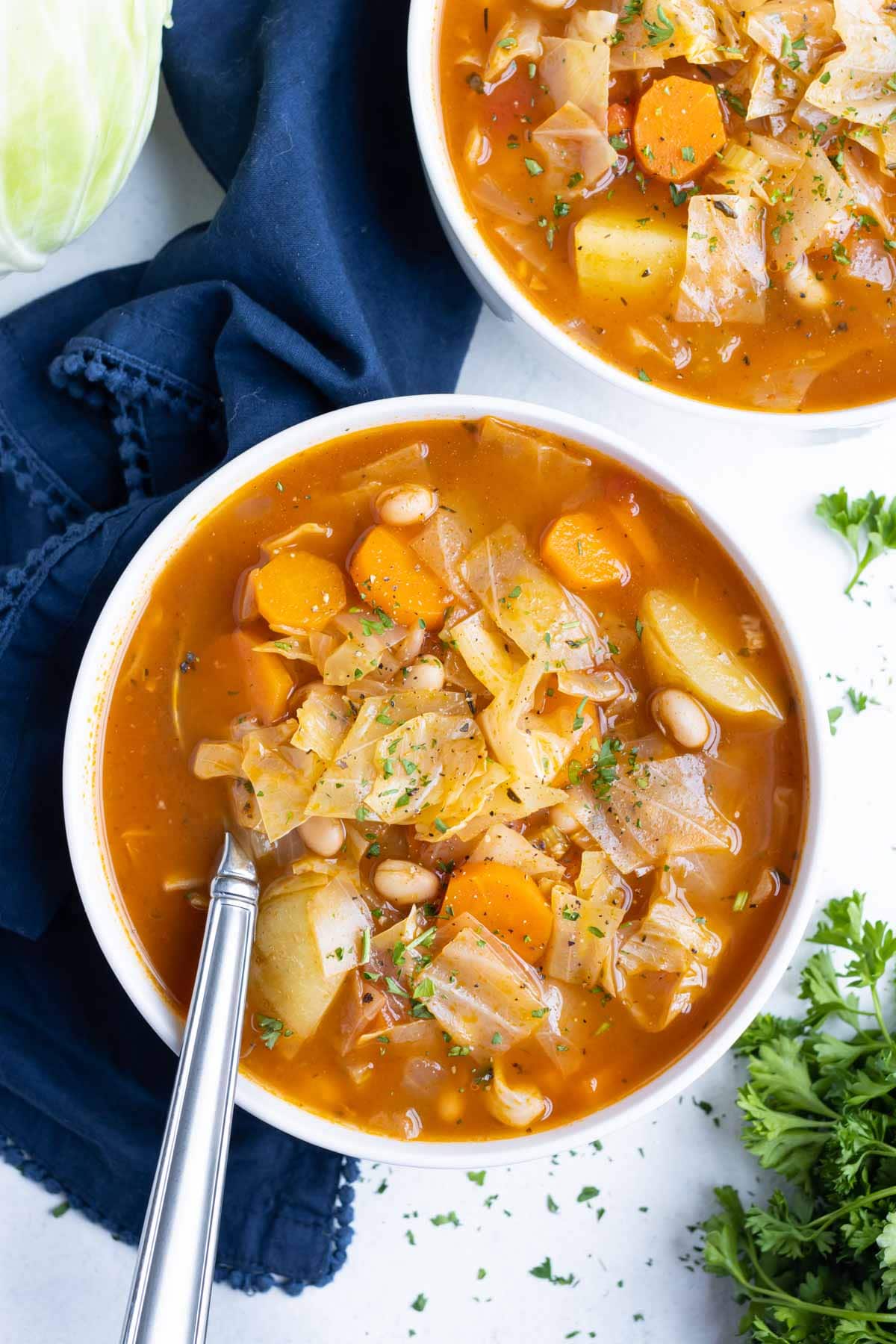
More Cabbage Recipes
Make the most of this nutritious, cruciferous powerhouse with even more cabbage recipes:
Tap stars to rate!
Cabbage Soup with Vegetables Recipe
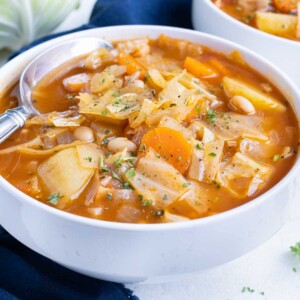
email this recipe!
Ingredients
- 2 tablespoons oil
- 1 small sweet onion diced
- 3 medium carrots cut into ½-inch slices
- 3 stalks celery finely chopped
- 4 cloves garlic finely minced
- 8 ounces can diced tomatoes canned
- 8 ounces tomato sauce canned
- 6 cups vegetable broth regular sodium
- 1 tablespoon Worcestershire sauce
- 1 teaspoon thyme dried
- ½ teaspoon oregano dried
- ½ teaspoon paprika
- 2 teaspoons salt
- ½ teaspoon black pepper
- 15 ounces can white beans cannellini, Northern, or navy, rinsed and drained
- ¾ pound Yukon gold potatoes cut into ½-inch cubes
- 1 small head cabbage cut into 1-inch pieces, about 8-10 cups
Instructions
- Add 2 tablespoons of oil to a dutch oven or large pot, over medium heat. Sauté onion, carrots, and celery for 3-4 minutes. Add garlic and continue sautéing for an additional minute.2 tablespoons oil, 1 small sweet onion, 3 medium carrots, 3 stalks celery, 4 cloves garlic
- Pour in the diced tomatoes, tomato sauce, broth, Worcestershire sauce, thyme, oregano, paprika, salt, and pepper. Stir until well combined.8 ounces can diced tomatoes, 8 ounces tomato sauce, 6 cups vegetable broth, 1 tablespoon Worcestershire sauce, 1 teaspoon thyme, ½ teaspoon oregano, ½ teaspoon paprika, 2 teaspoons salt, ½ teaspoon black pepper
- Rinse and thoroughly drain the beans, rinse and cut the potatoes into ½-inch cubes, and prepare the cabbage by coring it and then cutting it into 1-inch pieces.15 ounces can white beans, ¾ pound Yukon gold potatoes, 1 small head cabbage
- Add these ingredients to the pot and stir until everything is well incorporated. It’s OK if the cabbage is not completely submerged, it will shrink down once it starts cooking.
- Bring the soup to a boil and then reduce heat to medium. Cover the pot with a lid and simmer for 20-25 minutes, or until the vegetables are tender.
- Serve immediately with a sprinkle of fresh parsley and enjoy!
Tap stars to rate!
Video
Notes
- DIY: Use fresh beans and tomatoes for the most flavor.
- Thick: Use additional tomato sauce for a thicker soup.
- Prep-Ahead: Except for the garlic and potatoes, the vegetables can all be washed and chopped in advance, up to 2-3 days ahead. Garlic should be minced or pressed fresh, and potatoes should be cut at most 1 day ahead, and stored submerged in a bowl of cold water in the fridge.
- Storage: This dish will keep in an airtight container in the fridge for up to 4-5 days.
- Freezing: Cabbage soup can be kept frozen in an airtight container for up to 3 months. However it is recommended to remove any chunks of potato in the soup prior to freezing, because their texture can turn unpleasant across the process of freezing and reheating.
- Reheating: To avoid overcooking the vegetables during reheating, it is recommended to let the soup – if frozen – thaw in the fridge at least 1 day in advance. From the fridge, it can be reheated by serving in the microwave, or in bulk over medium heat on the stovetop until warmed through.
Nutrition
Nutrition information is automatically calculated, so should only be used as an approximation.

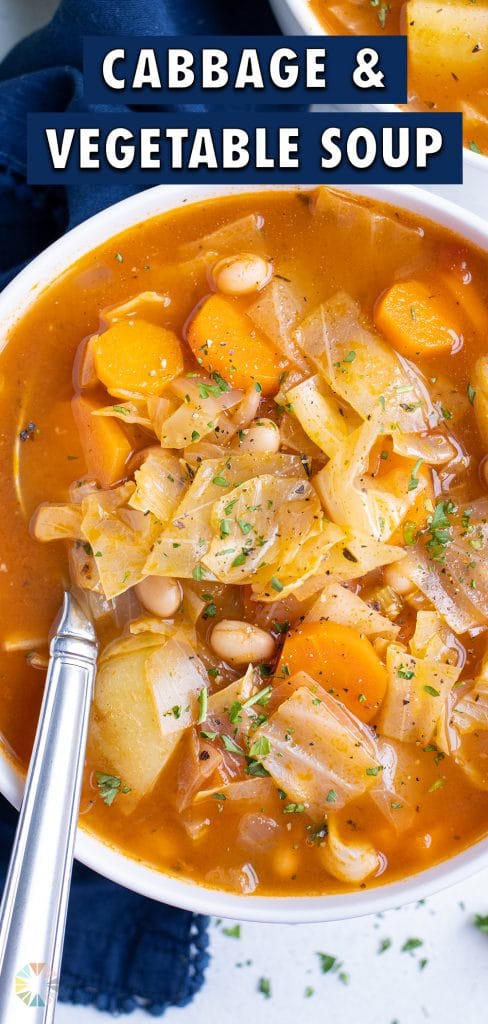














Made this recipe this evening, and it turned out fantastic! Love it! Thanks for the awesome recipe!
Yay! So happy to hear you enjoyed the recipe, Marc! Thanks so much for taking the time to leave a comment!